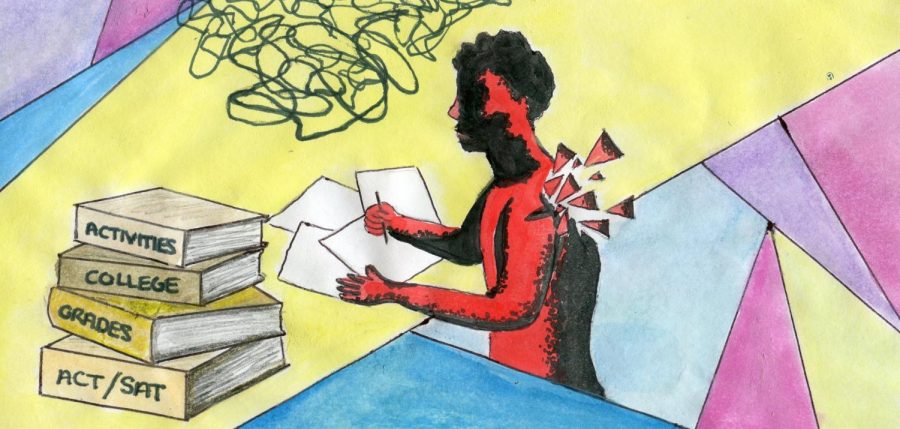Students experience effects of school-related anxiety
April 22, 2019
Freshman Maya Williams* laughs with her friends during finals week when she suddenly starts thinking about her English final next block. The room around Williams starts to spin and she feels her knees go weak as she begins to spiral into an anxiety attack, an unfortunately familiar feeling. Her friends try to help, but it takes another 15 minutes for Williams to calm down.
Williams was diagnosed with performance anxiety in eighth grade and often feels very anxious before tests or sports games, she says. Although it has gotten less frequent, Williams says she often experiences anxiety attacks. While her anxiety often flares up before she performs something, Williams explained that she also gets anxious about grades, high expectations in school and the upcoming college process.
“[When I have a panic attack], my stomach hurts, and sometimes I start crying, or it’s hard to breathe,” Williams said.
The best thing for someone with anxiety to do is be open about what they are experiencing, Williams says. She said that she felt a lot better after she was able to talk to someone instead of keeping everything inside.
“A lot of people feel alone, like they’re a burden when they talk about [their anxiety], so I want people to know that others want to help,” Williams said. “If you’re anxious, talking about [your worries] is not putting all your problems on others, it’s helping you, [which is] important.”
Symptoms of school-driven anxiety present in different forms, including a constant feeling of worry, lack of sleep, and difficulty attending school, according to School Psychologist Amanda Middleton. In school, anxiety stems from class rigor, a busy schedule and social anxiety, according to Middleton.
“Anxiety is one of the most common reasons that students seek support in Student Services,” Middleton said.
For sophomore Isabelle Simmons*, different symptoms of social anxiety add onto the struggles of anxiety she experiences when met with school expectations.
“In terms of social anxiety, it’s a lot of avoiding situations,” Simmons said. “Sometimes, if my family goes out to eat, I’ll stay in the car because I’m [not] hungry, so why would I put myself through [an anxiety-inducing situation]?”
Simmons has also found an outlet in opening up about her struggles.
“[I started] an Instagram account where I post funny stuff, and explain what’s going on [with me]” Simmons said. “[The account] could just be for you, you don’t have to let anyone follow it.”
Senior Katie Schmidt* also deals with school-related anxiety on a daily basis, and says the anxious feeling never goes away. Schmidt believes a big source of anxiety for her is the competitiveness between students about grades scores. Students should be striving to succeed out of personal self-motivation instead of comparison, Schmidt believes.
“For some people, their best is a C,” Schmidt said. “I don’t think other people should make them feel bad because their best is an A, [which is] something that a lot of people don’t understand.”
Like Schmidt, Simmons understands the anxiety about the difficulties of school, but finds that she has grown and slowly overcome her obstacles.
“In eighth grade, I was really quiet, but starting my freshman year, I [tried] to raise my hand more, [which] helped me to become more comfortable,” Simmons said.
Middleton believes it’s important to raise awareness on the reality of mental health, especially in a time when mental health is becoming a widely discussed issue.
“We don’t treat mental health like we do physical health,” Middleton said. “When someone has anxiety or depression, we don’t think of it the same way. That’s one of the biggest [stigmas] of mental health that students face.”
*Names have been changed



